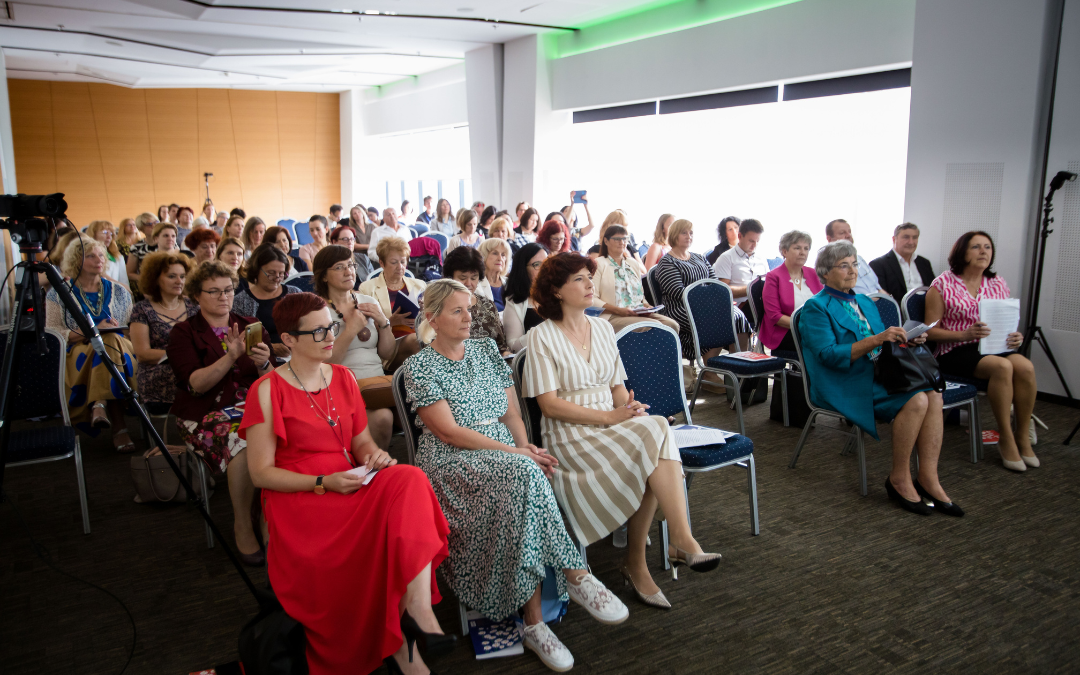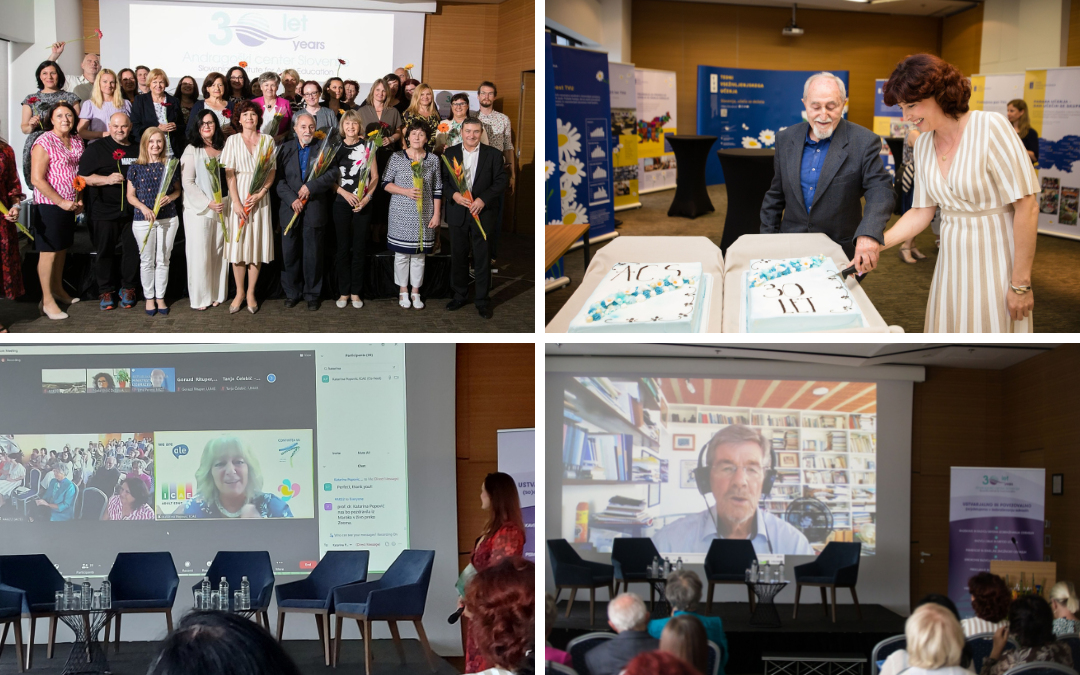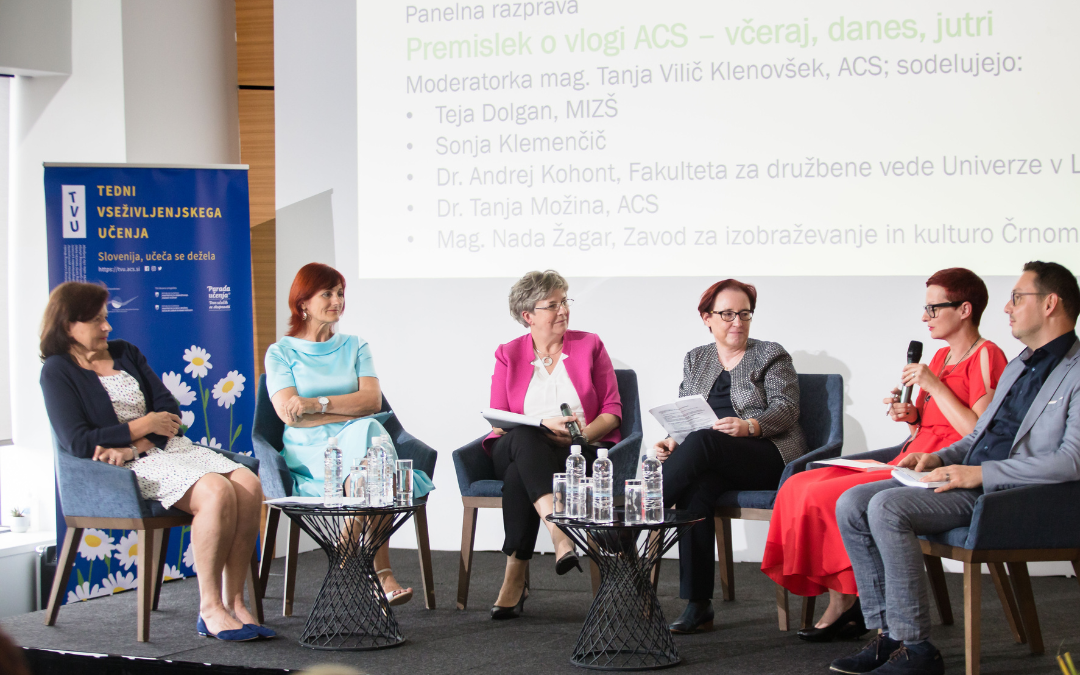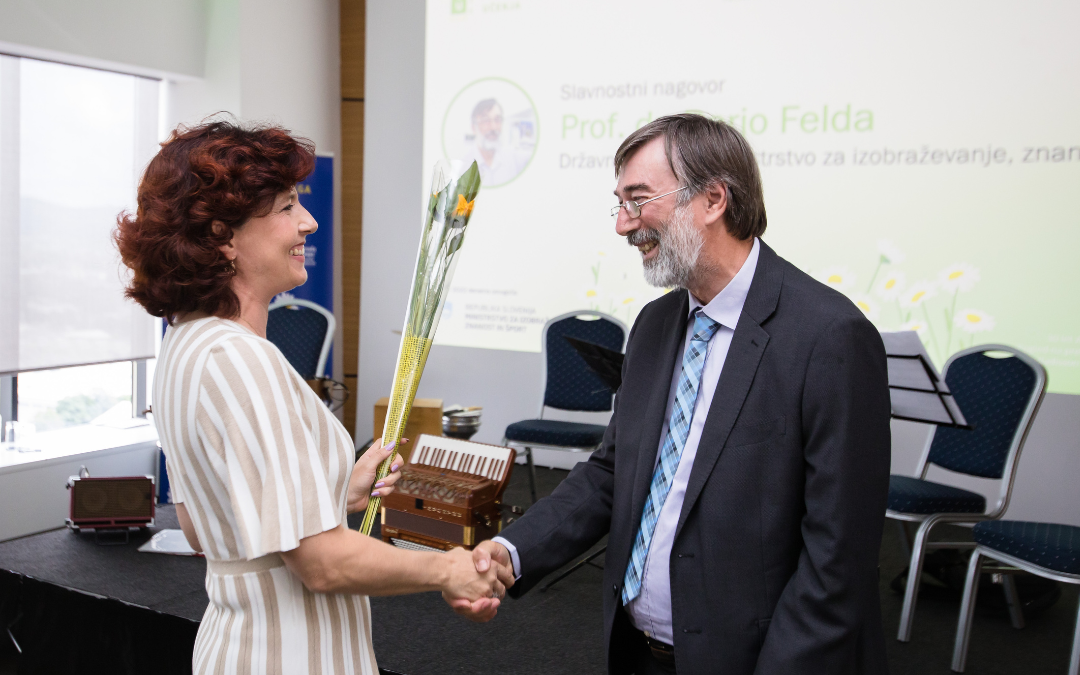On 7 June, we celebrated the 30th anniversary of the SIAE at this year’s AEC. The latter is a professional event traditionally held as part of the LLW; this time it was the 26th in a row. Between 80 and 90 people gathered in person at the Radisson Blue Plaza Hotel in Ljubljana. Additonal 40 to 50 professional colleagues and friends of our institution joined the event online.
Through her speech, the SIAE directress Dr Nataša Potočnik reflected on the operation and mission of the central national institution for research, development and promotion of ALE. She emphasised that the event was devoted to global and local questions, which everyone should confront themselves with, as they affect the quality of all our lives.
In the first part of the AEC, entitled Education for the Emerging World, Prof Dr Ana Krajnc shed light on that part of this “future”, which is now the past. From her narration, which also touched on the subject of establishing the SIAE, it is clear that it was a combination of more or less favourable conditions (e.g. general vitalism at the time of Slovenia’s independence), but above all, a noble idea which sooner or later becomes a reality. It took time, ingenuity and courage, but above all, a genuine commitment for what the professional public had defined and justified much earlier to become a reality.
“In the 1990s, Slovenian adult educators were the only ones in the region who were aware of the importance of this field for the development of society in the future,” added Dr Katarina Popović, Secretary General of the International Council for ALE (ICAE) in her congratulations. She joined the event live from Morocco, where she was preparing for the seventh International Conference on Adult Education CONFINTEA VII.
Dr Nevenka Bogataj, a debater in the first panel, said that those (of us) who thought about the future of ALE thirty or more years ago are now living it. And how does the SIAE’s work fit into the unpredictable times that lay ahead? Zvonka Pangerc Pahernik, MSc, presented a new culture of coexistence. The phrase derives from the findings of the forums carried out in 2021 in the EAAL project, where we addressed various topics with experts from multiple fields and advocated for the importance of learning for a quality life. The reflections of Prof Dr Polona Domadenik Muren on education in companies started a lively discussion. During the health crisis, the share of employees that participated in education increased; however, the ratio between the participation of less and more educated employees remained unchanged. We have concluded that adult educators explain this differently than HR experts, employers and trade unions.
In the second part of the Colloquium, Dr Zoran Jelenc, the first director of the SIAE, shared similar thoughts only through concrete data. He summarised his views on the further development of the field in 10 points.
Teja Dolgan, Sonja Klemenčič, Dr Tanja Možina, Nada Žagar, MSc, and Dr Andrej Kohont participated in the panel moderated by Tanja Vilič Klenovšek, MSc. They looked back at the beginnings of the (co)operation in adult education and shed light on some upcoming challenges. Among them are planned high-quality research and development of ALE and care for the career development of adult educators. In the past, we have not thought about some questions and problems as intensively as we do today.
Perhaps we sensed them and unconsciously incorporated them into our actions and plans, but we certainly did not have a clear idea of their extent at the time. Not all challenges that arise with development and require education can be foreseen, which is why ALE is essential. And what is more, they cannot be solved with a school curriculum created in the past that cannot clearly define the future. However, it is also clear that school curriculum development is a long-term process, which is reflected in the obsolescence of the programmes as soon as they are approved. As pointed out by the head of the ALE sector at MESS, Teja Dolgan, ALE is, on the contrary, very dynamic and, as such, has an important role not only in the transfer but especially in the creation of knowledge. Learning is life, and life is learning! All this is undoubtedly related to the development of technology – artificial intelligence, digitalisation problems and various crises, such as (were) the pandemic, the socio-economic crisis, wars, and migrations. All this is inextricably intertwined with the environment – we could even say with our living space and way of life. The latter was discussed in a plenary lecture entitled Adult Education – A Good Life for a Learning Planet presented by Prof Dr Timothy D. Ireland.
Most Slovenian andragogy is based on the views of Paul Freire and the Slovenian pedagogue and andragogue Karl Ozvald. Through the excellent interpretation of Dr Blažka Müller, who was the first to translate Freire’s Pedagogy of the Oppressed into Slovenian, both giants of andragogical ideas had their say in the solemn part with which we concluded the AEC. The music group Anbot also created a fantastic atmosphere. Directress Dr Nataša Potočnik thanked former directors of the SIAE, former and current employees and other significant colleagues by handing out flowers.
We were incredibly honoured and pleased to welcome the new state secretary at MESS, Prof Dr Darjo Felda, at the event. We understood his participation as a sign of goodwill and understanding of the very complex field of lifelong learning, which cannot be effective if it does not include ALE.
After the event, we received, among other things, the following feedback: “A very well-planned and high-quality programme, which was excellently and professionally executed.” The survey results show that at the AEC 2022, we opened up several topics that we will further discuss at future events. Did you miss the event, or would you like to see the contributions again? The recording (in Slovenian) is published on the AEC website.
Natalija Žalec, MAEd (UK) (natalija.zalec@acs.si), SIAE








